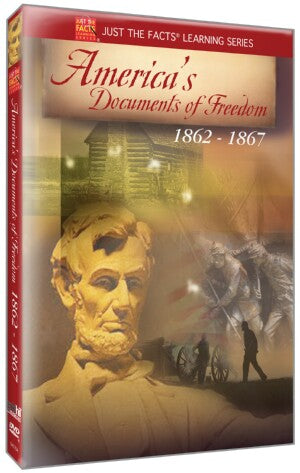Just the Facts: America's Documents of Freedom 1862-1870
American democracy has a lineage of written records that we can trace to show the development of our nation, and how each document builds on those before it to make our foundation of freedom stronger. This video looks at the documents conceived in the early 1860s and during the Civil War and the years immediately following.Homestead Act, Pacific Railway Act and Morrill Act (1862) -- The Homestead Act encouraged the settlement of the American West by granting up to 160 acres of land for those who would work the land. The Pacific Railway Act gave land to railroad companies to develop rail lines linking East and West coasts. The Morrill Act helped states to fund agricultural and engineering colleges. Emancipation Proclamation (1863) -- The controversy over slavery finally exploded into war.åÊ Abraham Lincoln freed "all persons held as slaves within any state" in rebellion against the United States.åÊ åÊGettysburg Address (1863) -- Abraham Lincoln dedicated a national cemetery at the Civil War battlefield at Gettysburg, Pennsylvania, with this historic speech. åÊ13th Amendment (Proposed January 1865, ratified December 1865) -- This amendment to the Constitution made it unlawful for anyone to own a slave. Slavery is outlawed within the United States. åÊFreedmen‰۪s Bureau ActåÊ (1866) -- The Freedmen's Bureau agency was established in 1865 to provide assistance to the emancipated blacks of the South after the Civil War. This act was intended to extend the life of the agency. åÊCivil Rights Act of 1866 (1866) -- Freed slaves were granted citizenship by this congressional bill, but it was vetoed by President Andrew Johnson. åÊ åÊ14th Amendment (Proposed June 1866, ratified July 1868) -- This amendment granted full rights of citizenship to all persons born or naturalized in the United States, with the exception of Native Americans. åÊFirst Reconstruction Act (1867) -- Congress divided the South into five military districts, each under a major general. New elections were to be held in each state with freed male slaves being allowed to vote.åÊ 15th Amendment (Proposed February 1869, ratified March 1870) åÊ-- The third of the so-called "Civil War Amendments" gave African-American men, including former slaves, the right to vote.






